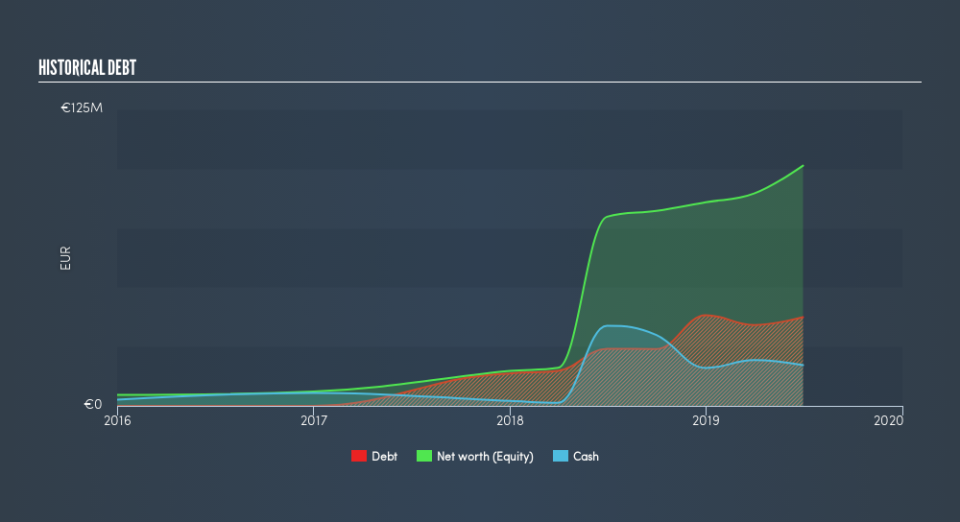Better Collective (STO:BETCO) Seems To Use Debt Quite Sensibly

David Iben put it well when he said, 'Volatility is not a risk we care about. What we care about is avoiding the permanent loss of capital.' So it might be obvious that you need to consider debt, when you think about how risky any given stock is, because too much debt can sink a company. We note that Better Collective A/S (STO:BETCO) does have debt on its balance sheet. But is this debt a concern to shareholders?
Why Does Debt Bring Risk?
Debt is a tool to help businesses grow, but if a business is incapable of paying off its lenders, then it exists at their mercy. In the worst case scenario, a company can go bankrupt if it cannot pay its creditors. While that is not too common, we often do see indebted companies permanently diluting shareholders because lenders force them to raise capital at a distressed price. Of course, the upside of debt is that it often represents cheap capital, especially when it replaces dilution in a company with the ability to reinvest at high rates of return. When we examine debt levels, we first consider both cash and debt levels, together.
Check out our latest analysis for Better Collective
What Is Better Collective's Net Debt?
The image below, which you can click on for greater detail, shows that at June 2019 Better Collective had debt of €37.4m, up from €24.0m in one year. However, because it has a cash reserve of €17.2m, its net debt is less, at about €20.2m.
A Look At Better Collective's Liabilities
According to the last reported balance sheet, Better Collective had liabilities of €25.4m due within 12 months, and liabilities of €64.3m due beyond 12 months. Offsetting this, it had €17.2m in cash and €11.0m in receivables that were due within 12 months. So its liabilities outweigh the sum of its cash and (near-term) receivables by €61.5m.
Of course, Better Collective has a market capitalization of €326.9m, so these liabilities are probably manageable. But there are sufficient liabilities that we would certainly recommend shareholders continue to monitor the balance sheet, going forward.
We use two main ratios to inform us about debt levels relative to earnings. The first is net debt divided by earnings before interest, tax, depreciation, and amortization (EBITDA), while the second is how many times its earnings before interest and tax (EBIT) covers its interest expense (or its interest cover, for short). This way, we consider both the absolute quantum of the debt, as well as the interest rates paid on it.
Better Collective's net debt is only 0.85 times its EBITDA. And its EBIT easily covers its interest expense, being 17.9 times the size. So you could argue it is no more threatened by its debt than an elephant is by a mouse. On top of that, Better Collective grew its EBIT by 74% over the last twelve months, and that growth will make it easier to handle its debt. When analysing debt levels, the balance sheet is the obvious place to start. But it is future earnings, more than anything, that will determine Better Collective's ability to maintain a healthy balance sheet going forward. So if you're focused on the future you can check out this free report showing analyst profit forecasts.
Finally, a business needs free cash flow to pay off debt; accounting profits just don't cut it. So we clearly need to look at whether that EBIT is leading to corresponding free cash flow. In the last three years, Better Collective's free cash flow amounted to 37% of its EBIT, less than we'd expect. That's not great, when it comes to paying down debt.
Our View
Happily, Better Collective's impressive interest cover implies it has the upper hand on its debt. But, on a more sombre note, we are a little concerned by its conversion of EBIT to free cash flow. When we consider the range of factors above, it looks like Better Collective is pretty sensible with its use of debt. That means they are taking on a bit more risk, in the hope of boosting shareholder returns. We'd be motivated to research the stock further if we found out that Better Collective insiders have bought shares recently. If you would too, then you're in luck, since today we're sharing our list of reported insider transactions for free.
Of course, if you're the type of investor who prefers buying stocks without the burden of debt, then don't hesitate to discover our exclusive list of net cash growth stocks, today.
We aim to bring you long-term focused research analysis driven by fundamental data. Note that our analysis may not factor in the latest price-sensitive company announcements or qualitative material.
If you spot an error that warrants correction, please contact the editor at editorial-team@simplywallst.com. This article by Simply Wall St is general in nature. It does not constitute a recommendation to buy or sell any stock, and does not take account of your objectives, or your financial situation. Simply Wall St has no position in the stocks mentioned. Thank you for reading.


